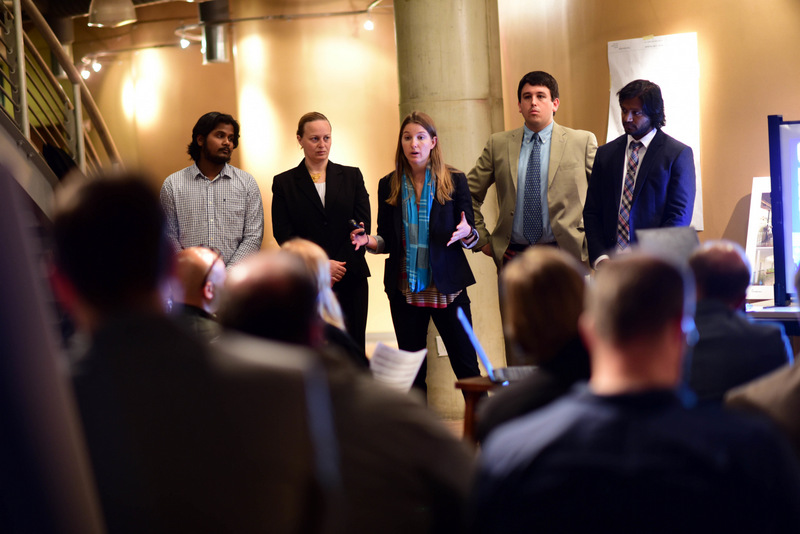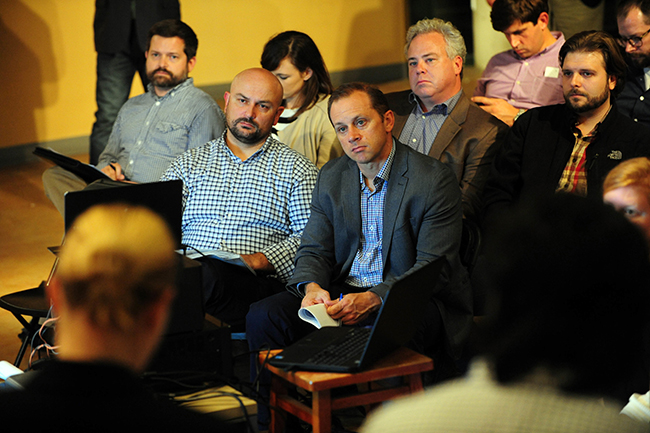New course explores the process behind new products

What does it take to create a successful product? According to John Clarke, it’s probably not what you think.
“It’s kind of a myth that there has to be some kind of epiphany,” says Clarke, a professor of practice in management at Tulane University’s A. B. Freeman School of Business. “The reality is there’s a process behind the development of successful products, and the ability to understand that process is critical, regardless of what industry you’re in.”
Clarke is the instructor in New Product Development in the Hospitality Industry, an MBA course that takes a granular look at the methodologies companies use to take new product and services from the drawing board to the marketplace. Clarke developed the course with his co-instructor, hospitality consultant and entrepreneur Paco Robert (MBA ’11), as a bookend to New Venture Planning. Unlike that course, which focuses on the venture’s business model, New Product Development puts the focus squarely on the product offering.
“It’s all about dissecting the problem and developing a concept in terms of how the user would interact with it,” Clarke explains. “We teach several methodologies for doing product development, and we help the students understand it by having them actually develop products and services and then testing them.”
In the first half of the semester, students partnered with three companies – New Orleans-based confectioner Sucré, charitable organization Hogs for the Cause and supermarket chain Whole Foods Market – to create synergistic new products and services that would enhance revenues, grow margins, expand markets or help them enter new markets. Whole Foods Board Chairman John Elstrott was so impressed with the ideas presented, he submitted the students’ deliverable to Whole Foods co-founder and CEO John Mackey at the conclusion of the presentation.
The class also worked with Jeff Salyers, senior marketing manager for Zatarain’s, to understand the company’s internal process to develop new product ideas. They students were challenged to look for extensions to current products and new product opportunities.
“They came up with really strong ideas,” Salyers says of the exercise. “I was impressed with the class in that it was less about theory and more about how do you make this work—what’s differentiated about your product and could it potentially be a viable idea. That’s a difficult but very good thing to bring into the classroom.”
In the second half of the class, students were challenged to use what they’d learned to develop their own new products. Working in five-member teams, the students brainstormed, researched and developed new hospitality-related products and services. The ideas ranged from a user-friendly restaurant recommendation app to a clothing rental service geared toward young business travelers.
In keeping with the course’s unconventional approach — there are no textbooks, quizzes or tests — Clarke had the students validate and refine their ideas by sending them to the French Quarter to find hospitality professionals, expert users and prospective customers to interview.
“It’s critical to engage directly with the users you are designing for in their environments,” Clarke explains, “and it just so happens the French Quarter boasts more hospitality product users than just about anywhere else in the country.”
The class culminated with a showcase at the new home of the New Orleans Culinary and Hospitality Institute (NOCHI) before an audience of 20 hospitality entrepreneurs and professionals. After a short introductory session, each of the teams pitched its idea, answered questions and received detailed feedback from attendees. The evening wrapped up with a reception that gave students a chance to network with some of the entrepreneurs in attendance.

“I loved the class,” says PMBA student Ahmed Mohiuddin, a physician at Tulane Medical Center whose team developed the clothing rental concept. “Although it was geared toward the hospitality industry, I never really thought about that because the skills were so applicable to really anything.”
That’s a message Clarke hopes all his students take away from the course.
“The course is designed for people who are interested in developing capabilities in product development, but we’re all involved in product development all the time,” Clarke says. “Because of the rapid changes taking place in the world, companies have to constantly be reinventing themselves. No matter where we work or what function we’re in or what industry we work for, there is an aspect of product development in our jobs.”
With the business school's recent agreement to occupy space in the New Orleans Culinary and Hospitality Institute, Freeman School Dean Ira Solomon says New Product Development in the Hospitality Industry could be the first of several new hospitality-related offerings.
"There's been an explosion of hospitality entrepreneurship in New Orleans, and NOCHI is primed to become a hub of that activity," says Solomon. "With classroom space at NOCHI and our longstanding expertise in entrepreneurship, I think we'll be perfectly positioned to serve the educational needs of this very exciting market."
To see photos from the students' product development presentations at the New Orleans Culinary and Hospitality Institute, visit the Freeman School's Flickr page.
Interested in advancing your education and/or career? Learn more about Freeman’s wide range of graduate and undergraduate programs. Find the right program for you.
Recommended Reading
- Meet the MBA Class of ’27: Andrew Karcher
- Meet the MBA Class of ’27: William Baird
- A Family Affair: Tulane’s Executive MBA Brings Parents and Children Together
- Matthew Higgins: The Strategy of Innovation
- EMBA travel stipend helps execs get to class
- Pierre Conner: The Future of Energy Is Now
- Meet the MBA Class of ’26: Joshua Christian
- What Can You Do With a Business Analytics Degree?
Other Related Articles
- Keeping it cool: MBAs help Convention Center find its temperature sweet spot
- Quartz: Companies that replace workers with AI ‘risk mediocrity,’ expert warns
- BBC News: ChatGPT will soon allow erotica for verified adults, says OpenAI boss
- Business Insider: Why a professor of finance isn't impressed by gold's stunning rally in 2025
- Meet the MBA Class of ’27: Cameron Pyne
- Meet the MBA Class of '27: Mark "Rennie" Merhige
- EMBA Marine rises through the ranks
- Meet the MBA Class of '27: Dee Parekh
